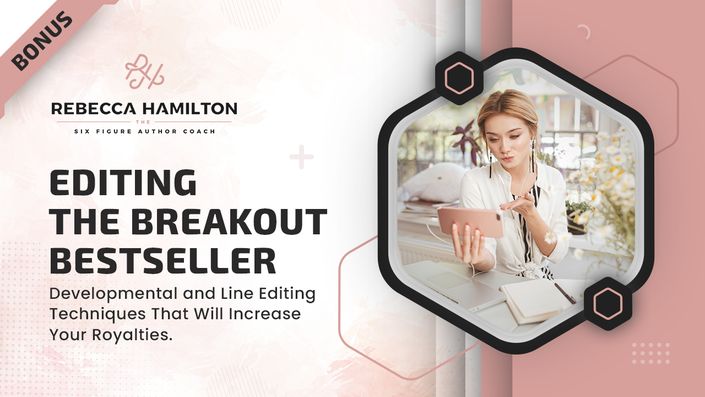
Editing the Breakout Bestseller
Discover Editing Insider Secrets
& Finally Make The Profit You Deserve
Even if you’re overwhelmed and don’t know where to start.
There are three big problems authors make when it comes to editing fiction:
- Ineffective Self-Editing
- No Self-Editing At All
- Hiring Editors Out of Order
You put dozens of hours into your book.
Have an eye-catching cover.
Write a high-converting blurb and first chapter.
You excitedly launch only to get poor reviews and low sell-through.
What happened?
Your editor, or your self-editing, let you down.
But self-editing the right way can make your editor more effective.
Before we continue, let’s get this out of the way: self-editing and editing are not the same.
Even if you have the knowledge to do all the things an editor can do, there’s one piece you will never have: distance from your own work.
Which begs the question: Why should you bother to self-edit at all when you’ll need an editor anyway?
Good question.
A self-edited draft will allow your editor to do a better job editing and more quickly.
If you have problems on top of problems in your writing, an editor can't fix it all in one pass without essentially rewriting your book for you, and that’s going to cost you a small fortune while potentially erasing your voice.
Self-editing reduces edits, which saves money.
Finally, we need to address hiring editors out of order.
Many authors don’t think about this, but the order of edits is important because it will save you a lot of work in the long run.
If you hire a line editor and apply their edits, and then hire a developmental editor, the second round of edits may result in new line-level problems.
By completing your editing rounds in the correct order, you can reduce the total amount of edits your project will need and eliminate double-work.
We all know that rewrites are hard.
No one wants to cut thousands of words that they worked hours to write.
Or remove entire scenes, or add new ones when they thought they were already done with the book.
It’s discouraging.
If you feel that way, you're not alone.
The goal is to make money on your books or (at the very least) have readers enjoy them.
This brings me to an important question:
Would you rather spend dozens of hours on a project that will fall flat with the intended audience?
OR
Would you rather spend an additional dozen hours making it a book that will be enjoyed by the masses?
I bet it’s the latter, and if so, I want to help you!
Hi, I’m Rebecca Hamilton and I’ve:
- helped over 500 authors hit the USAT or NYT bestseller list.
- personally hit the USA Today bestseller list with a single title on multiple occasions.
- hit the New York Times bestseller list with a single title on my first try.
- taught hundreds of authors how to make six to seven figures a year writing fiction.
Now, with the help of one of the lead Editors on my Team (Hey hey hey, Heather Streble!), we’ve put together the solution to every big problem that authors face with editing…
Editing The Breakout Seller
An in-depth, self-led course with step-by-step developmental and line editing techniques that will reduce overwhelm and increase profits.
Whether you’re brand new to writing or editing fiction, been at this for a while without progress, or have made some progress, but you've gotten stuck, Editing The Breakout Seller is perfect for authors and editors at any level.
After this course, you will improve your fiction writing by:
- fleshing out characters, making sure the story makes sense, and ensuring that the plot flows well.
- improving scene content and pacing, as well as hooking the reader chapter by chapter.
- better understanding creative writing technique, voice, logic, and awkward phrasings
- fixing your confusing sentences while improving consistency, accuracy, and tone to match what your audience is looking for.
- Correcting errors in your spelling, grammar, punctuation, and formatting (different from a proofreading editing) so you don’t present yourself as an inexperienced author.
Take a look inside…
Module 1: The Editing Process
Overview of the entire editing process: the order of edits and how it will save time and money.
Module 2: Developmental Rewrites
Planning for both chapter and novel rewrites without the overwhelm using four proven strategies to flesh out your novel. Plus my own personal strategy for assessing progress.
Module 3: Chapter Level Revisions
Scene content, pacing, and writing an addictive story on a chapter-by-chapter basis.
Module 4: Point of View Concepts
Revising common mistakes authors make when writing in first and third persons. Editing for alternating point of view.
Module 5: More Exploration into POV and Head Hopping
Choose a point of view to write in and stay in to tell a streamlined, well-organized story that keeps the narrative flowing for easy comprehension.
Module 6: Deeper Point of View
Key elements to writing a deep point of view and when it's appropriate to reveal what about your character for the greatest impact.
Module 7: Fixing Passive Voice
Eliminate passive voice by focusing on the words you use in aid of passive voice instead of subject and objects, while remaining active and engaging.
Module 8: Line Edits
Improve writing by revealing emotion and eliminating overused words.
Module 9: Dialogue Edits
Level up your dialogue with little-known tactics (that even experienced authors don’t know) for more varied and richer writing.
Module 10: Rhythm of Prose (Hold the Purple)
Making music in a narrative form with sentence rhythm so that readers fall in love with your writing.
Module 11: Mechanical Edits (Sentence Styles)
Independent and dependent clauses, run on sentences, fragments, introductory clauses, and parenthetical phrases.
Module 12: Mechanical Edits (Narrative Grammar)
Grammar that demonstrates strong writing and creates an enjoyable experience for the reader.
Module 13: Mechanical Edits (Punctuation)
Commas, semicolons, colons, hyphens, and apostrophes.
Module 14: Voice and Style
What you say, the words you use to say it, and the way you arrange the words while saying it with grammatically correct sentence structures and proper punctuation.
Who is The Editing The Breakout Bestseller for?
- Both new and established fiction authors who are worried about getting bad reviews and that their book isn’t going to sell
- Editors who want to improve their skills and make more money
- Authors and editors who enjoy self-led learning without having to piece meal random (usually unhelpful) information from searching Google
___________
Authors that I work with consistently bring in 6 and 7 figures from their book sales. I took everything related to editing that I did for myself and my clients and put it in this course.
Yes, you can Google and find free resources and other courses on editing and revising, and you can even attempt to hodge-podge it all together, but we include lessons and concepts you can’t learn anywhere else.
Besides, if you want to learn from someone who has created a proprietary method for authors to hit and maintain 6+ figures based on years of success, why look any further?
Your time is now!
Take Your Career To The Next Level.
Get Editing The Breakout Bestseller Now!
Your Instructor

Rebecca Hamilton is a New York Times bestselling author who moved her writing career to the slow lane to focus on her family and on helping other authors build their careers. Over the last four years, she has helped hundreds of authors move from part time hobby writing to full time career writing. Many of her "graduates" have moved on to make $5k-40k+ a month writing books, and 20% Amazon's bestselling authors are Rebecca's past or current clients. Her 2018 one-on-one coaching clients have experienced 100% success rates with her 14 Step Method, though she also offers smaller courses for authors who just want to dip their toes into the publishing pool first, before diving in.
